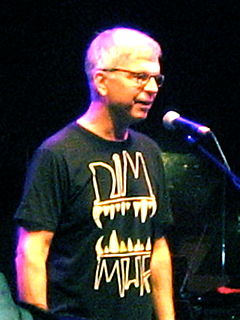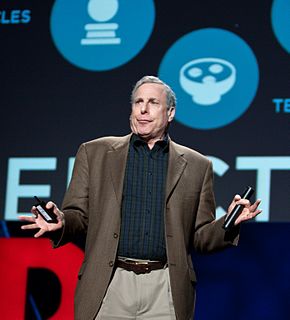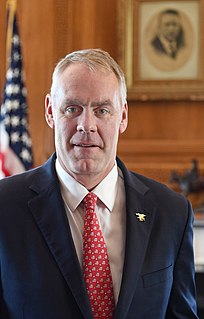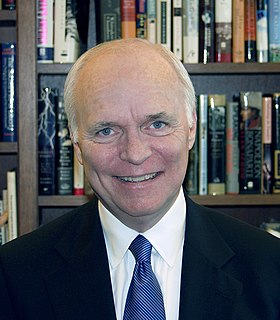Top 1200 Nuclear Technology Quotes & Sayings - Page 16
Explore popular Nuclear Technology quotes.
Last updated on April 21, 2025.
The real concern is that Iran would do what Pakistan did. Pakistan wanted nuclear weapons, like Iran, purely for defensive reasons - to defend itself against India. The problem was that once Pakistan acquired the weapons, it allowed the country to be more aggressive. So they stepped up their support for the Kashmiri terrorists, and it led very quickly to the Kargil crisis in 2000, which almost sparked a nuclear war between India and Pakistan.
I am much less concerned with whatever it is technology may be doing to people that what people are choosing to do to one another through technology. Facebook's reduction of people to predictively modeled profiles and investment banking's convolution of the marketplace into an algorithmic battleground were not the choices of machines.
There's already a lot of active research going on using the Crispr technology to fix diseases like Duchenne muscular dystrophy or cystic fibrosis or Huntington's disease. They're all diseases that have known genetic causes, and we now have the technology that can repair those mutations to provide, we hope, patients with a normal life.
The Europeans are starting to show that they're finally serious about the Iranian nuclear program, and they appear to be willing to use sticks against Iran. So I think it is imperative that the United States sit down with the Europeans and say, "Let's make this very clear to the Iranians. Either they can give up their nuclear program and their support for terrorism, in which case we'll given them all kinds of benefits. Otherwise, we'll join in comprehensive, multilateral sanctions that will cripple their very fragile economy."
Wireless is the largest information, communication, and technology platform in history, and mobile broadband is transforming how we can deliver educational materials and experiences to all students. The technology now exists to support learning on a massive scale and advance the 21st century skills needed to compete in the global economy.
Space has not changed but technology has, in many cases, improved dramatically. A good example is digital technology where today's cell phones are far more powerful than the computers on the Apollo Command Module and Lunar Module that we used to navigate to the moon and operate all the spacecraft control systems.
With communication technology in general, there's a kind of certain critical mass of people. Once you get to 15% of the world's entire population using one communication technology, that's a big deal. It's beyond the theoretical at this point. The people who think it's a fad have probably not been paying that much attention.
Technology is the perfect refuge for African capability stifled elsewhere by badly run governments and years of misplaced foreign aid. Ubiquitous connectivity in a world without legacy infrastructure, together with the potential to learn coding or anything else online, has allowed technology entrepreneurship to flourish.
Without a deal [with Iran], the international sanctions regime will unravel with little ability to reimpose them. With this deal, we have the possibility of peacefully resolving a major threat to regional and international security. Without a deal, we risk even more war in the Middle East and other countries in the region would feel compelled to pursue their own nuclear programs, threatening a nuclear arms race in the most volatile region in the world.
I can tell you, Obamacare, I have been stunned by the pratfalls associated with its implementation. I simply can't understand how a president that had such an effective technology campaign and has such support among the technology community members could have put in place the implementation of Obamacare as ineffectively as he did.
You know, everyone is always talking about plastic surgery, or the technology, what to do. I really think it's important to help yourself with the technology if you want to feel better, but I am absolutely against any kind of monstrous cuts of the body, lifting that is beyond recognition, this kind of stuff.
Technology is incredibly powerful. And in many ways, the sky is the limit in terms of what you can actually accomplish with the right science and the right technology. But to get there, you have to actually invest in R&D. And often that means you have to be willing to spend an awful lot in that R&D phase before you see the benefits.
Technologists provide tools that can improve people's lives. But I want to be clear that I don't think technology by itself improves people's lives, since often I'm criticized for being too pro-technology. Unless there's commensurate ethical and moral improvements to go along with it, it's for naught.
If we're not able to launch our own people and operate our own spacecraft anymore then, you know, space - whether it should be or not, it's seen as like a harbinger of technology. If you can fly people into space, if you can operate into space, then you've got high technology and if you're the leader of that, then you're the leader in technology. If we lose that on a more or less permanent basis, or for a long period of time, my fear is that it will creep into the national psyche in all areas and we as a nation as a whole will kind of be diminished.
In the mid-1980s, operating problems took [nuclear] plants off-line so often that, on an annual basis, they operated at only about 55 percent of their rated total generating capacity. Today, as a result of several decades of experience and an intense focus on performance ... nuclear plants in the United States operate at over 90 percent of capacity. That improvement in operating efficiently is so significant in its impact that it can almost be seen as a new source in electric power itself.
Iran has been calling for it for years, and the Arab countries support it. Everyone except the United States and Israel support it. The U.S. won't allow it because it means inspecting Israel's nuclear weapons. The U.S. has continued to block it, and in fact blocked it again just a couple of days ago; it just wasn't widely reported. Iran's nuclear program, as U.S. intelligence points out, is deterrent, and the bottom line is that the U.S. and Israel don't want Iran to have a deterrent.
In the near future, despite the development of alternative energy, when you look at the economics and environmental standards, then there's no other source of primary energy in the world than natural gas. Well, perhaps there is nuclear energy but there are also a lot of issues there and there are opponents of nuclear energy. Gas doesn't have those opponents. But there is a country that is, obviously, the world leader in gas reserves. That's our country, the Russian Federation.
We've proven that our technology works and that Hyperloop One is the only company in the world that has built an operational Hyperloop system. As we move towards the commercialization of our technology, we'll continue to work with governments and embrace public-private partnerships to reimagine transportation as we know it.
I know we need more nuclear power in order - nuclear power, after all, is not dependent on fossil fuels and emits no greenhouse gases. I believe we're going to be able to have coal-fired plants that have zero emissions. We need to work on carbon sequestration technologies. I mean, there's a lot we can do together and achieve the objective, which a lot of people want, which is the reduction of greenhouse gases, and at the same time, have viable economic growth.
























































